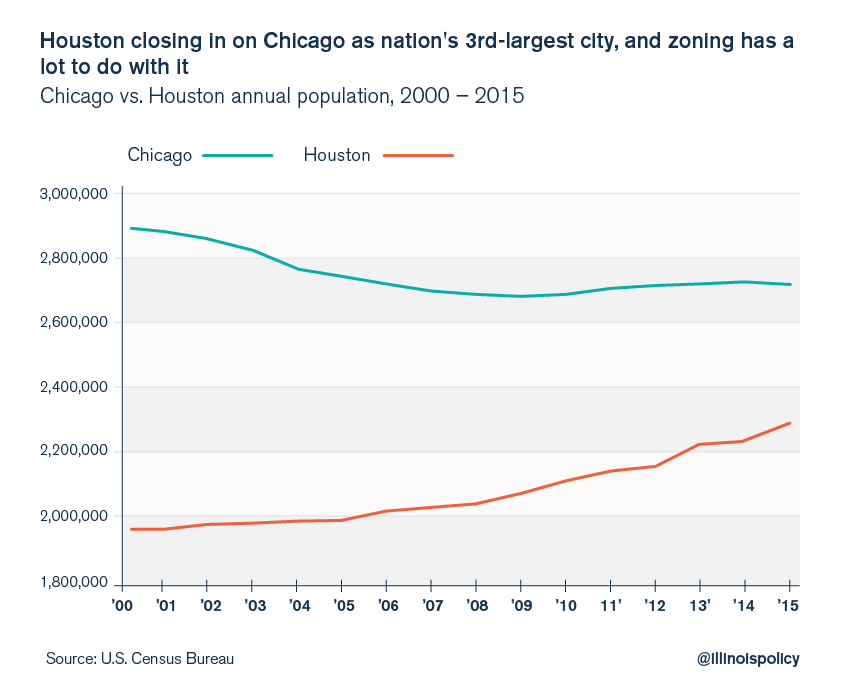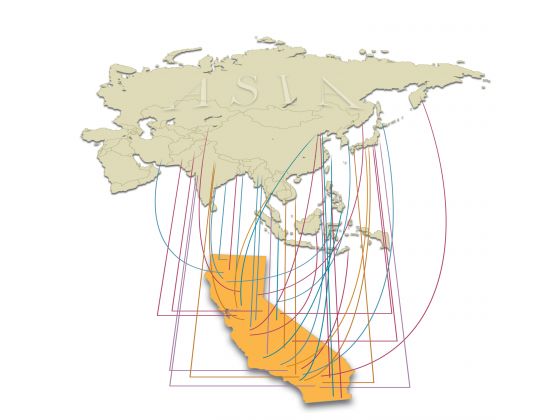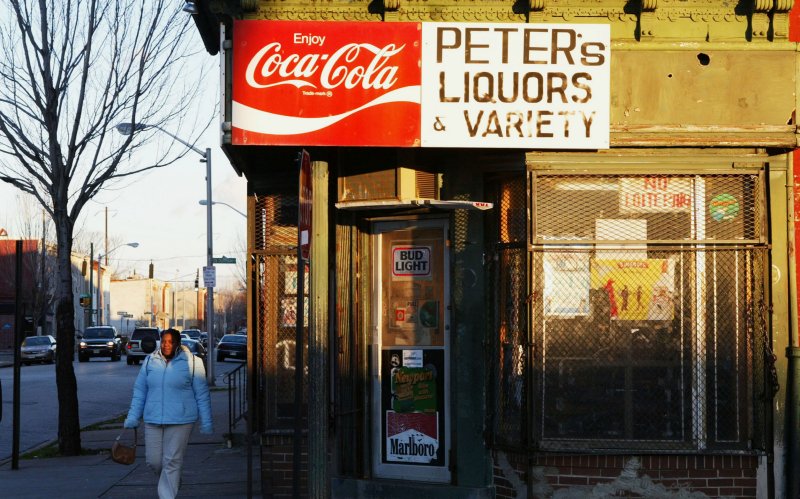How Zoning Rules are Helping Houston Overtake Chicago as America’s 3rd-Largest City
By Mark Adams
As Chicago’s population shrinks, Houston is set to overtake the Windy City as the third-largest city in America. Illinois’ slumping economy is a major reason for that, but the cities’ different zoning rules show how regulations can promote growth – or stifle it.

Chicago’s population is shrinking, according to data released May 19 by the U.S. Census Bureau. Between 2000 and 2015, the difference between the two cities’ populations halved. If trends continue, Houston, Texas, will become America’s third-largest city in just a decade. Without doubt a big part of the reason is Illinois’ sluggish economic growth and Springfield’s budgetary problems. But there’s another reason for Houston’s success: the city’s unique approach to zoning, which makes housing more affordable and abundant.
Unlike every other major, American city, Houston never adopted a zoning code. Which means Houston doesn’t tell developers what they can build or where they can build it. In many ways, Houston’s approach has not produced radically different outcomes from most other cities: Commercial, industrial and residential uses are largely separated, as they would be in any other city, by developer’s choice.
The big difference for Houston is how quickly developers can respond to market demand. New developments require fewer permits than in most other cities. That means fewer legal costs. And projects can move forward much faster, which means developers, or entrepreneurs, aren’t sitting on investment, waiting for the city to make a decision. The minimal approach to zoning also allows for greater certainty: Developers can make investments with certainty about the outcome of the process.
All of this adds up to a lower cost of building, which translates to lower housing costs and a friendlier environment for entrepreneurs.
Chicago’s burdensome zoning means less housing at a higher cost
Chicago, by contrast, subjects developers to an expensive, time consuming, and highly uncertain process. And even though the Windy City is losing people there is still a lack of affordable housing close to the city’s amenities which forces middle-class residents to the suburbs or out of the city entirely.
In many cases, aldermen set excessively restrictive zoning laws as a negotiating tool to extract concessions from developers in return for waivers. Much of the city outside downtown is zoned for single-family housing but a developer might be allowed if to build an apartment complex if he also funds a park the alderman wants. Unsurprisingly, many developers eschew the costs and risk associated with gaining permission to build larger units. Instead, when developers tear down older buildings, they are often more likely to build mansions than new apartments.
This process inevitably results in less housing supply and a higher cost of living. But the solution is not to prevent developers from tearing down old buildings. In fact, the failure to replace old buildings is part of the problem. Chicagoans who can afford to live in more affluent areas, such as Lincoln Park, generally demand more space than developers originally assumed. As a result, houses once built for four or five people may now only accommodate two or three residents.
Even as Illinois’ economic woes may cause people to leave Chicago, popular areas should be gaining population. Instead, we observe the opposite: People who cannot afford the neighborhood are forced to leave. And while many may go to other neighborhoods or to the suburbs, some will move even farther afield, leaving the state altogether. Some may even end up in Houston.
Zoning affects population in another way. Starting a business often requires a zoning change. Many home businesses are illegal in residential neighborhoods. And something as simple as hanging a sign can take months and require hundreds of dollars. More complex zoning changes can cost far more and be prohibitively expensive for many small entrepreneurs. And without a job, many residents cannot afford to live in the city at any cost.
Restrictive zoning laws have helped make Chicago the world’s seventh-most expensive city. And they have prevented Chicago from growing to meet the changing needs of residents. Fixing those laws alone may not be enough to stop Houston from overtaking Chicago, but it is an essential component of reversing the Windy City’s decline.
This post was originally published by the Illinois Policy Institute on 6/3/2016








